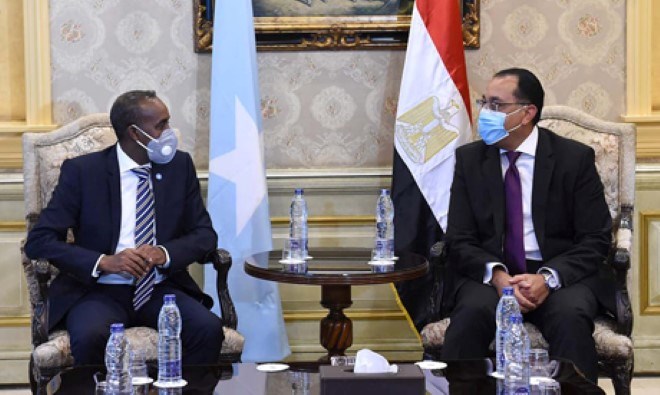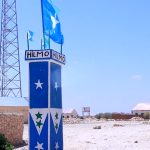Roble was in town for a three-day visit and was received by Prime Minister Mustafa Madbouli who held two rounds of talks, one attended by both prime ministers and one also attended by Egypt’s ministers of foreign affairs, education and health and their visiting Somali counterparts.
Roble’s visit is the third by a high-ranking Somali official to Cairo in a year, with previous visits having included one by the Somali foreign minister.
During his visit, Roble was received by the Grand Imam of Al-Azhar Sheikh Ahmed Al-Tayeb. Al-Azhar operates a prominent institute in Mogadishu and offers scholarships to Somali students.
“Education has always been one of the most prominent areas of cooperation between our two countries. For decades, Egypt, through the national education system and through Al-Azhar, has provided educational support to Somalia,” Mohamed Nasr, the Egyptian Ambassador in Mogadishu, said.
He added that this support had always been highly appreciated by the Somali people, who thought fondly of Egypt as an education destination.
“Actually many prominent Somali figures received their education in Egyptian schools in Somalia, or by Egyptian teachers, or even went to Egyptian universities,” Nasr said.
Roble himself studied for a few years in Egypt, and one of the things that was agreed during his talks in Cairo was to boost educational cooperation between the two countries, Nasr said.
In the years prior to the outbreak of over a decade-long civil conflict in Somalia in the early 1990s, Egypt had run a school in almost every region of the country. In Mogadishu, it ran a prominent school that carried the name of former president Gamal Abdel-Nasser, whose memory is cherished on the continent 50 years after his death.
In the 1990s, Egypt tried to put an end to the devastating civil conflict and hosted several rounds of political dialogue in pursuit of reconciliation. However, with so many political developments around the Middle East, Cairo got a lot more focused on the Arab problems, while Somalia was falling into disrepair.
With the end of the conflict in Somalia, Egypt tried to pick up the pieces of its educational presence in this important country in the Horn of Africa. “Starting in 2015, Egypt has been systematically working on consolidating its relations with Somalia,” Nasr said.
Roble’s visit, he added, was designed to underline the commitment of both sides to working together towards stronger ties. “I think part of what makes our relations so important is that they never overshadowed the many other issues that we are both interested in,” Nasr said.
Roble’s visit comes a few months ahead of the national elections that are scheduled tentatively for October this year in Somalia. The elections, earlier announced by Roble, are meant to spare the country from the possible political crisis that has been in the making since Somali President Mohamed Abdullahi Farmaajo attempted to delay these elections for two years.
The attempt stirred political unrest, and Roble stepped in to offer a political compromise through the elections. He has since been at the head of the process leading to the elections.
Nasr said that Egypt was not planning to get involved in internal Somali affairs. What Egypt was keen on was boosting development in Somalia and aiding in political coordination, he added.
According to Amira Abdel-Halim, lead researcher on the Horn of Africa at the Al-Ahram Centre for Political and Strategic Studies in Cairo, “in the final analysis the outcome of these elections is important for Egypt in the sense that anything that influences the stability of Somalia is important for Egypt.”
For Egypt, the Horn of Africa is a national security concern, especially vis-à-vis the Red Sea. It is also close to the Nile Basin.
These have always been two strategic areas of concern for Egypt, Abdel-Halim said, adding that “the Red Sea is a very important region for Egypt, and it has become highly militarised with many foreign countries building military or logistics bases in the countries of the Horn of Africa.”
In addition to Turkey — that has become during the past two decades a key player in this region and other parts of Africa including the equally crucial Sahel and Sahara zone — other foreign countries that have some sort of presence in the Horn of Africa include, Italy, US, France, Russia, China and the United Arab Emirates.
Egypt, government officials say, is not planning to press its interests in the region at the expense of members of the region, but it cannot look the other way when foreign powers, including Arab and non-Arab states, are expanding their presence.
For example, Qatar, for several years a political foe of Egypt and both the United Arab Emirates and Saudi Arabia, who have had alliances with Egypt, acted during the past decade to expand in the region, Abdel-Halim said.
Egypt, she added, “has been legitimately trying to balance this situation to make sure that its strategic interests around the Red Sea and in the Nile Basin are not compromised”. This reach-out, she noted, has been trying to cover all the countries of this region at the highest level possible.
She added that winning Somalia over is crucial both for the security of the Red Sea and also in view of the current conflict with Ethiopia over the Grand Ethiopian Renaissance Dam (GERD) was also important for Egypt.
Ethiopia has often tried to “undermine Somalia,” she said, adding that this had been “either through military interventions or political maneuvering”.
According to Abdel-Halim, Ethiopia was “largely” to blame for the radicalisation of the Al-Shabab movement in Somalia. “Originally Al-Shabab was stimulated to resist Ethiopia’s military and political presence in Somalia and along the road the movement got radicalised,” she said.
Today, Abdel-Halim argued, helping Somalia stand on its own two feet is crucial to helping it face up to the attempts of foreign countries to intervene in its affairs, “Ethiopia or any other country”.
“Sparing Somalia from the conflicting agendas of other countries is a crucial first step for stability since the country has suffered a lot due to repeated interventions from countries in and out of the region,” she said.
“I think there is an understanding in Somalia, both at the official and public levels, that Egypt is not trying to take control of the political will of Somalis,” Abdel-Halim said. Still, she added, it is also understood and accepted that Egypt has some crucial interests that it would wish Somalia to accommodate, including those related to Red Sea security and the GERD conflict.
According to Nasr, coordination and consultations between the two countries will continue, covering all aspects of bilateral and regional issues.





